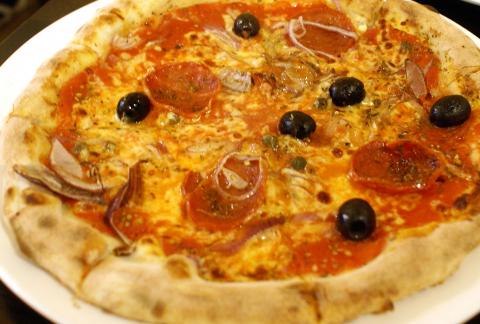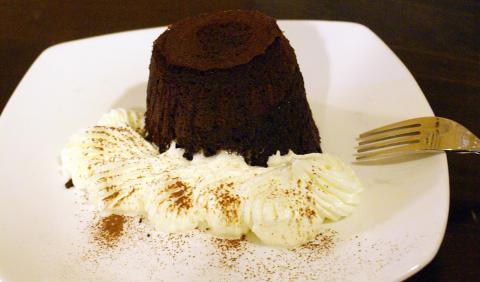Opened in February in a nondescript building near the entrance to Linjiang Street Night Market (臨江街觀光夜市) off Anhe Road (安和路) Section 2, Zoca Pizzeria Caffetteria has quickly earned a devoted following among lovers of thin-crust pizza. The interior is simple, warm and inviting — made more so by the fragrant smell of baking dough wafting out of the stone oven where Italian national Federico Zocatelli bakes up one of the best pizzas this reviewer has eaten in Taipei.
Zoca’s big draw is its 43 varieties of pizza. In fact, aside from one kind of lasagna (NT$220), a daily soup (NT$50) a house salad (NT$50) and dessert, there is little else on the menu. All pizzas are 10-inch, but as each is rolled to order, they often come to the table slightly larger.
We ordered the Pugliese (NT$350), a robust and savory combination of tomato sauce, mozzarella, spicy sausage, red onion, whole pitted black olives, capers and oregano, and the lighter Italia (NT$350), a vegetarian combination of tomato sauce, mozzarella and ricotta cheeses, fresh tomato and spinach. The bottoms of the pizzas were thin and charred to crispy perfection in the middle, and puffy and chewy at the crust. Both arrived piping hot less than 10 minutes after ordering, and were gobbled down in even less time.

Photo: Noah Buchan, Taipei Times
Some may balk at the amount of toppings on Zoca’s pizzas because they tend towards the minimal. For those who do want a thicker crust or more veggies, just add NT$50. Double cheese boosts the bill by NT$80, while extra ham or salami is NT$100. In this reviewer’s opinion, though, patrons will do well to leave their pizza in Zocatelli’s capable hands.
For more adventurous diners, my chatty and attentive server recommended the dolce vita (NT$400), a sweet and savory combination of tomato sauce, mozzarella, mascarpone, ham, nuts and honey. The menu also features competitively priced standards such as the marinara (NT$180) and Margherita (NT$250), as well as rich concoctions such as the mari e monti (NT$600), which is topped with mozzarella, ricotta, porcini mushrooms, bacon, parsley and seafood.
Vegetarian options include the vegetariana (NT$350), which is topped with tomato sauce, mozzarella, grilled eggplant, zucchini, sweet pepper, spinach and potato and the estate (NT$300), a combination of tomato sauce, mozzarella, fresh tomato and pesto sauce.

Photo: Noah Buchan, Taipei Times
Pizza is not the only thing Zoca does from scratch. Be sure to weave to the back of the tastefully done menu where there are desserts such as tiramisu (NT$140), panna cotta (NT$100) and ricotta cheese cake (NT$130). I tried the tortina di ciocolato (NT$140), a devilishly delicious molten chocolate cake served with whipped cream.
As Zoca’s popularity continues to soar, reservations are strongly advised, especially if your party exceeds two persons.

Most heroes are remembered for the battles they fought. Taiwan’s Black Bat Squadron is remembered for flying into Chinese airspace 838 times between 1953 and 1967, and for the 148 men whose sacrifice bought the intelligence that kept Taiwan secure. Two-thirds of the squadron died carrying out missions most people wouldn’t learn about for another 40 years. The squadron lost 15 aircraft and 148 crew members over those 14 years, making it the deadliest unit in Taiwan’s military history by casualty rate. They flew at night, often at low altitudes, straight into some of the most heavily defended airspace in Asia.

Beijing’s ironic, abusive tantrums aimed at Japan since Japanese Prime Minister Sanae Takaichi publicly stated that a Taiwan contingency would be an existential crisis for Japan, have revealed for all the world to see that the People’s Republic of China (PRC) lusts after Okinawa. We all owe Takaichi a debt of thanks for getting the PRC to make that public. The PRC and its netizens, taking their cue from the Chinese Communist Party (CCP), are presenting Okinawa by mirroring the claims about Taiwan. Official PRC propaganda organs began to wax lyrical about Okinawa’s “unsettled status” beginning last month. A Global

Taiwan’s democracy is at risk. Be very alarmed. This is not a drill. The current constitutional crisis progressed slowly, then suddenly. Political tensions, partisan hostility and emotions are all running high right when cool heads and calm negotiation are most needed. Oxford defines brinkmanship as: “The art or practice of pursuing a dangerous policy to the limits of safety before stopping, especially in politics.” It says the term comes from a quote from a 1956 Cold War interview with then-American Secretary of State John Foster Dulles, when he said: ‘The ability to get to the verge without getting into the war is

Like much in the world today, theater has experienced major disruptions over the six years since COVID-19. The pandemic, the war in Ukraine and social media have created a new normal of geopolitical and information uncertainty, and the performing arts are not immune to these effects. “Ten years ago people wanted to come to the theater to engage with important issues, but now the Internet allows them to engage with those issues powerfully and immediately,” said Faith Tan, programming director of the Esplanade in Singapore, speaking last week in Japan. “One reaction to unpredictability has been a renewed emphasis on